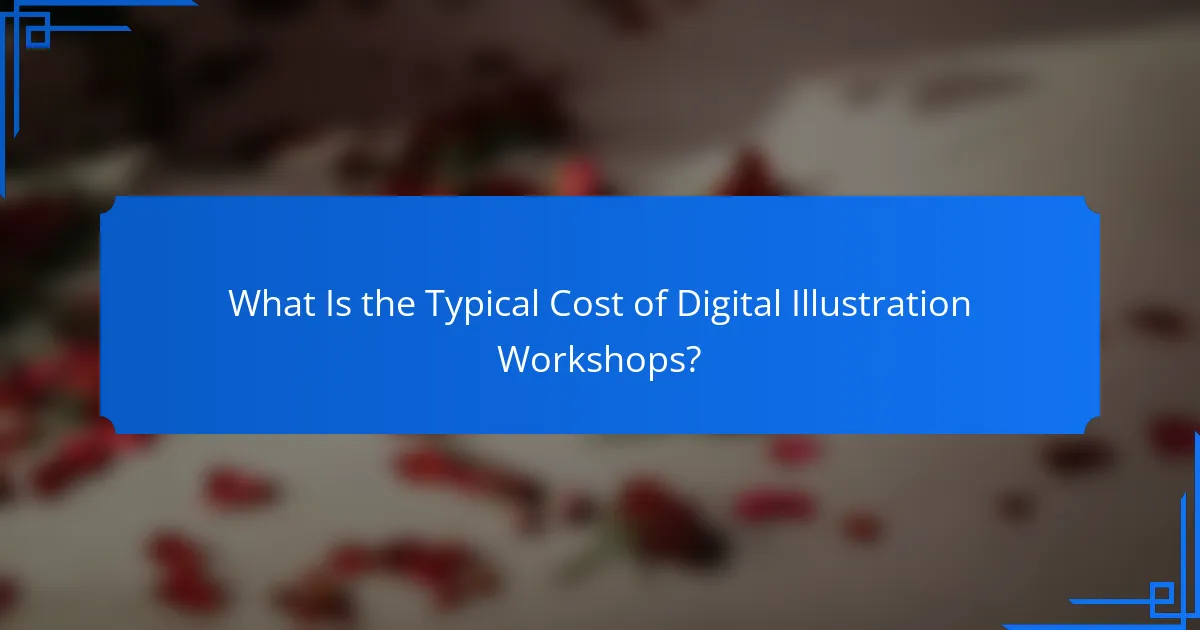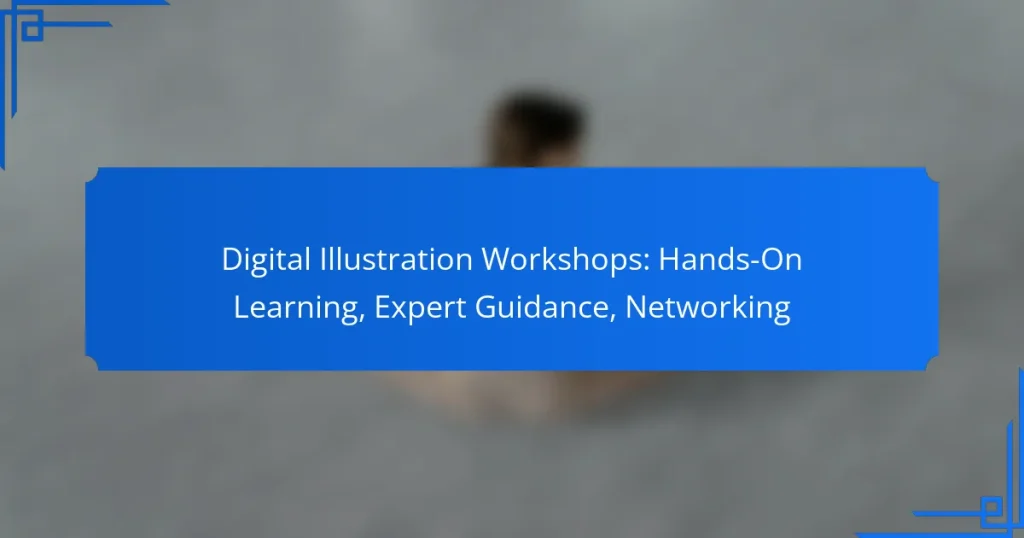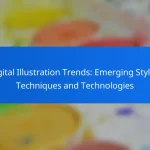Digital illustration workshops provide an excellent opportunity for hands-on learning, expert guidance, and networking within the creative industry. Participants can enhance their skills through practical projects and receive valuable feedback from experienced instructors. By choosing the right workshop, individuals can tailor their learning experience to meet their specific goals and connect with like-minded creatives.

What Are the Benefits of Digital Illustration Workshops?
Digital illustration workshops offer a range of benefits, including practical experience, expert mentorship, and valuable networking. Participants can enhance their skills while building connections that may lead to future opportunities in the creative industry.
Hands-on learning experiences
Hands-on learning is a cornerstone of digital illustration workshops. Participants engage in practical exercises that allow them to apply techniques in real-time, fostering a deeper understanding of the craft. This experiential approach helps solidify concepts and encourages creativity.
Workshops often include projects that mimic real-world scenarios, enabling attendees to tackle challenges they might face in their careers. For example, creating a digital illustration from concept to completion within a set timeframe can simulate a professional environment.
Expert guidance from industry professionals
Access to expert guidance is a significant advantage of digital illustration workshops. Instructors are typically seasoned professionals who share insights from their own experiences, providing valuable tips and techniques that are not easily found in textbooks.
Participants can receive personalized feedback on their work, helping them to refine their style and improve their skills. This mentorship can be crucial for those looking to break into the industry or elevate their existing abilities.
Networking opportunities with peers
Networking is an essential aspect of digital illustration workshops. Attendees have the chance to connect with fellow artists, which can lead to collaborations, friendships, and professional relationships. Building a network within the creative community can open doors to job opportunities and projects.
Workshops often encourage group activities and discussions, fostering an environment where participants can share ideas and learn from each other. Engaging with peers can provide fresh perspectives and inspire new approaches to illustration.
Portfolio development
Developing a strong portfolio is critical for aspiring illustrators, and workshops provide an excellent platform for this. Participants can create new pieces that showcase their skills, which can be included in their professional portfolios.
Instructors often guide students on how to curate their work effectively, emphasizing the importance of presenting a cohesive body of work that reflects their unique style. A well-crafted portfolio can significantly enhance job prospects in the competitive illustration field.
Access to industry tools and software
Digital illustration workshops typically provide access to the latest tools and software used in the industry. Familiarity with these resources can give participants a competitive edge when entering the job market.
Workshops may include training on popular software such as Adobe Illustrator or Procreate, allowing attendees to learn shortcuts and techniques that enhance their workflow. Understanding these tools is essential for efficiency and creativity in digital illustration projects.

How to Choose the Right Digital Illustration Workshop?
Choosing the right digital illustration workshop involves evaluating instructor qualifications, considering the format and duration, assessing participant skill levels, and checking for local versus online options. These factors will help ensure that the workshop meets your learning needs and goals.
Evaluate instructor qualifications
Instructor qualifications are crucial in determining the quality of a digital illustration workshop. Look for instructors with professional experience in the field, a strong portfolio, and teaching credentials. Their ability to provide constructive feedback and share industry insights can significantly enhance your learning experience.
Consider checking reviews or testimonials from previous participants to gauge the instructor’s effectiveness. A well-regarded instructor can make a substantial difference in your skill development.
Consider workshop format and duration
The format and duration of a workshop can impact your engagement and learning outcomes. Workshops may be offered in various formats, including intensive weekend sessions, weekly classes, or even month-long programs. Choose a format that fits your schedule and learning style.
Duration is also important; shorter workshops may provide a quick overview, while longer ones often allow for deeper exploration of techniques. Aim for a balance that suits your availability and desired depth of learning.
Assess participant skill levels
Understanding the skill levels of participants in a workshop is essential for ensuring a suitable learning environment. Workshops may cater to beginners, intermediate, or advanced illustrators. Select a workshop that aligns with your current skills to maximize your growth.
Some workshops may offer different tracks or levels, allowing you to choose based on your proficiency. Avoid workshops that are too advanced, as they may lead to frustration rather than skill enhancement.
Check for local vs. online options
When choosing a digital illustration workshop, consider whether you prefer local or online options. Local workshops provide hands-on experiences and networking opportunities with peers and instructors. They can be beneficial for building connections in your area.
Online workshops, on the other hand, offer flexibility and access to a wider range of instructors and styles. They can often be attended from anywhere, making them a convenient choice for busy individuals. Evaluate your preferences and circumstances to make the best choice for your learning journey.
![What Are the Top Digital Illustration Workshops in [Your Location]?](/wp-content/uploads/what-are-the-top-digital-illustration-workshops-in-your-location-3.webp)
What Are the Top Digital Illustration Workshops in [Your Location]?
The top digital illustration workshops in your area provide hands-on learning experiences, expert guidance, and valuable networking opportunities. These workshops cater to various skill levels and often include practical projects, critiques, and access to industry professionals.
Workshop A: Overview and offerings
Workshop A focuses on foundational skills in digital illustration, offering a mix of theory and practical exercises. Participants will learn about essential tools, techniques, and styles, enabling them to create compelling artwork.
This workshop typically runs for several weeks and includes weekly sessions that cover topics such as color theory, composition, and digital painting. Attendees can expect to complete a portfolio piece by the end of the course.
Workshop B: Overview and offerings
Workshop B emphasizes advanced techniques and personal style development for intermediate to advanced illustrators. This program includes personalized feedback from experienced instructors and opportunities to collaborate with peers.
Participants will engage in intensive sessions that delve into character design, storytelling through visuals, and the use of professional software. The workshop culminates in a showcase event where students can present their work to industry professionals.
Workshop C: Overview and offerings
Workshop C is designed for those looking to specialize in a specific niche, such as children’s book illustration or concept art for games. This focused approach allows participants to refine their skills and gain insights into industry trends.
The workshop includes guest lectures from successful illustrators and hands-on projects tailored to the chosen niche. Participants will leave with a deeper understanding of market demands and a polished piece suitable for their portfolio.

What Is the Typical Cost of Digital Illustration Workshops?
The cost of digital illustration workshops varies widely based on factors such as the instructor’s expertise, workshop duration, and location. Generally, participants can expect to pay anywhere from a few hundred to over a thousand dollars for comprehensive training.
Price ranges for beginner workshops
Beginner digital illustration workshops typically range from $100 to $500. These workshops often last a few hours to a couple of days and cover fundamental skills such as software basics and introductory techniques.
For example, a one-day workshop might cost around $150, while a weekend course could be priced at $400. Look for local community centers or online platforms for affordable options.
Price ranges for advanced workshops
Advanced digital illustration workshops generally cost between $500 and $1,500. These sessions are often more intensive, lasting several days and focusing on specialized techniques, portfolio development, and industry insights.
For instance, a week-long advanced workshop led by a renowned artist might be priced at $1,200. Participants should consider the depth of content and the instructor’s credentials when evaluating costs.
Potential discounts and scholarships
Many workshops offer discounts for early registration, group bookings, or students. It’s common to see reductions of 10-20% for signing up ahead of time or for bringing a friend.
Additionally, some organizations provide scholarships or financial aid for aspiring artists. Research local art schools or community programs that may offer funding opportunities to help offset costs.

What Should You Expect During a Digital Illustration Workshop?
During a digital illustration workshop, participants can expect hands-on learning experiences, expert guidance, and opportunities for networking. These workshops typically focus on enhancing skills in digital art creation while fostering connections with fellow artists and instructors.
Daily schedule and activities
A typical day in a digital illustration workshop includes a mix of lectures, demonstrations, and hands-on practice. Mornings may start with theory sessions covering design principles, followed by practical exercises in the afternoon.
Participants often engage in group critiques and collaborative projects, allowing for feedback and idea exchange. Expect to dedicate several hours each day to both learning and creating, with breaks for networking and informal discussions.
Materials and resources provided
Workshops usually provide essential materials such as drawing tablets, styluses, and software licenses, ensuring that participants have access to the tools needed for effective learning. Some workshops may also offer printed handouts or digital resources for reference.
In addition to physical materials, participants often gain access to online platforms for sharing work and receiving feedback post-workshop. This can include forums or social media groups where ongoing support and networking can continue beyond the event.


